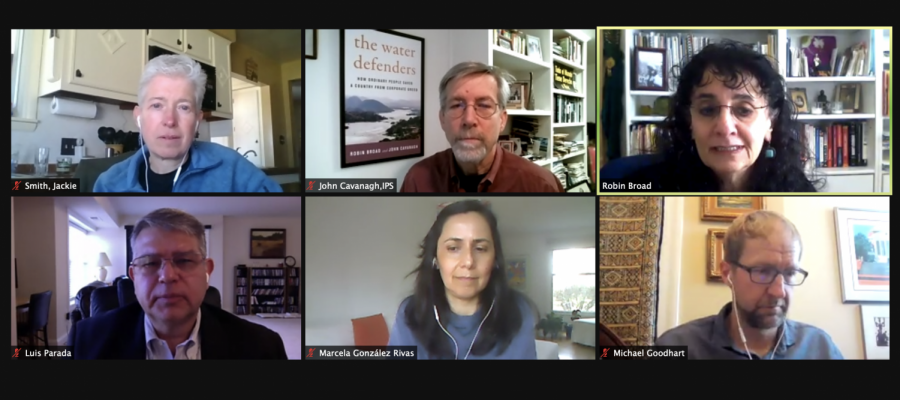Pitt hosts launch of new book ‘The Water Defenders’
Co-authors John Cavanagh and Robin Broad joined Pitt faculty and graduate students Friday afternoon for the launch of their new book “The Water Defenders: How Ordinary People Saved a Country from Corporate Greed.”
March 8, 2021
The United Nations declared access to safe drinking water a human right in 2010. Just a year before that decision, activists in El Salvador laid down their lives in order to protect their water supply.
Co-authors John Cavanagh and Robin Broad joined Pitt faculty and graduate students Friday afternoon for the first launch of their new book, “The Water Defenders: How Ordinary People Saved a Country from Corporate Greed.” The Department of Sociology, the Global Studies Center, the Graduate School of Public Health, the Graduate School of Public and International Affairs and Pittsburgh Collaboratory for Water co-sponsored the event.
“The Water Defenders” will be released March 23 and is now available for preorder. It follows activists in El Salvador as they fight to prevent the Pacific Rim Mining Corp. from operating on the Rio Lempa — El Salvador’s largest river and many residents’ main source of water. The company’s gold-mining process uses cyanide to separate gold from rock, meaning spills can have catastrophic consequences.
The book opens with the 2009 death of Marcelo Rivera, a 37-year-old teacher and leader of the National Roundtable on Mining in El Salvador, or La Mesa, one of the main groups opposing Pac Rim. According to the authors, Rivera’s killers used methods similar to those of the right-wing death squads who targeted grassroots activists in the 1980s and ’90s.
La Mesa earned an award from the Institute for Policy Studies, where Cavanagh acts as director. Reading from the book, Broad recounted how Rivera’s brother, Miguel, and another activist, Vidalina Morales, went to the ceremony in his place. Morales’ acceptance speech focused on Pac Rim’s lawsuit against El Salvador, which demanded that the country either grant it a mining permit or pay nearly $300 million in lost profit.
“Vidalina invoked the upside-down world summoned by Uruguayan writer Eduardo Galeano in asking why it was not El Salvador that was suing Pac Rim, since the mining company threatened the water and the well-being of the country,” Broad read. “But that upside-down world is the reality of global corporate power and economic rules that affect people around the globe.”
World Bank’s International Centre for Settlement of Investment Disputes found in favor of El Salvador in Pac Rim’s lawsuit, and in 2017 the country became the first in the world to ban metal mining. Cavanagh attributed La Mesa’s success to its ability to reach across national and political boundaries to gain allies like a conservative archbishop, a governor in the Philippines and a lawyer and former military official named Luis Parada, who attended Friday’s book launch.
“If you’re in a fight where you’re up against what feels like insurmountable odds, what the Salvadorans concluded is the only way they can win, is to win over unlikely allies. People who they disagreed with on a lot of things but they might find common ground, in this particular fight,” Cavanagh said.
According to Jackie Smith, a professor of sociology who moderated the discussion, “The Water Defenders” contains lessons for activists anywhere looking to take on large corporations — including those fighting coal mining and fracking in Pennsylvania.
“There’s a similar dynamic at work in regards to the organization of these transnational corporations and the international institutions that enable these corporations to supersede national law and democratic processes,” Smith said.
In addition to unlikely allies, Cavanagh identified the “bottom-up” leadership style of Rivera and other activists in northern El Salvador as a key component of the movement’s success. He said that area depends heavily on the Rio Lempa, so the residents took the task of researching the effects of mining into their own hands.
“They went across the river into Honduras and studied a country that was full of mines. Some of them went into the capital city and studied hydrology,” Cavanagh said. “And then they turn that information into fantastic education for the public.”
According to Broad, Pac Rim made alliances with local mayors and other government offices, starting programs under the guise of corporate social responsibility. She said this connection between Pac Rim and the government further complicates the issue of discovering who killed Rivera.
“They were kind enough to offer to go into the local schools and teach the students about all the good things that mining would bring — that was sarcasm in my voice,” Broad said. “When we look in this book at what Pac Rim did, it often is intertwined with, or goes through, the local government officials.”
Rivera would not live to see La Mesa prevail over Pac Rim, and according to Broad, authorities have yet to bring his killers to justice. Emphasizing the dangers that come with activist work in El Salvador, she said Rivera was one of four water activists killed in a short timespan.
“At what point do you decide that the risk is too much? And that’s part of what’s happened with continuing the investigation,” Broad said. “In Marcelo’s case, some of his family wants to raise it again, and some of the families are, understandably, very nervous.”



